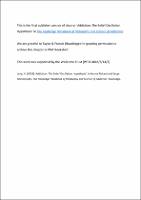Chapter 5 Addiction
Proposal review
The belief oscillation hypothesis
Abstract
In popular, philosophical and many scientific accounts of addiction, strong desires and other affective states carry a great deal of the explanatory burden. Much less of a role is given to cognitive states than to affective. But as Pickard and Ahmed (2016; see also Pickard 2016) note, addiction may be as much or more a disorder of cognition as of compulsion or desire. Pickard’s focus is on denial. In this chapter my focus will be different. I will argue that in many cases at least, we can explain the lapses of abstinent addicts by way of processes that do not involve motivated reasoning (as denial or self-deception plausibly do). Mechanisms that have the role of updating beliefs in response to evidence may alter addicts’ judgments concerning what they have most reason to do (in the precise circumstances in which they find themselves), and thereby cause them to act accordingly
Keywords
addictionISBN
9781315689197, 9781138909281, 9780367571504Publisher
Taylor & FrancisPublisher website
https://taylorandfrancis.com/Publication date and place
2019Grantor
Imprint
RoutledgeClassification
Health, illness and addiction: social aspects


 Download
Download